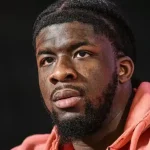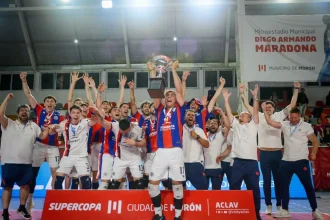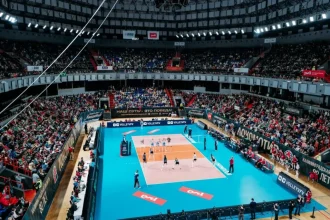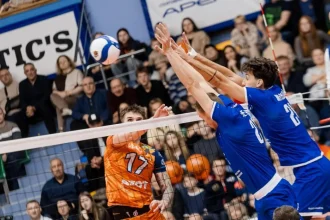From the moment Azumah Nelson steps out of his elegant home in a quiet suburb of Accra, it’s clear why he remains a towering figure in the boxing world. Nearly 67, “The Professor” moves with the same grace and purpose that defined his legendary career as a two-weight world champion. Wearing a white shirt adorned with a lion’s face, he carries an unmistakable warrior spirit.
But it’s Nelson’s deep brown eyes that leave the strongest impression — a gaze full of intelligence, depth, and unyielding determination. Though long retired, his legendary intensity remains undimmed.
I’m invited to Nelson’s home by British-Ghanaian promoter and manager Michael Amoo-Bediako, who has arranged for Boxing News to observe Nelson training 24-year-old Samuel Takyi, Ghana’s brightest young boxing prospect. Takyi, who signed with Amoo-Bediako’s Streetwise Management last year, is being groomed for world honours much like Richard Commey, whom Amoo-Bediako discovered in an Accra gym in 2010 and guided to an IBF lightweight title within six years.
“I sent Samuel to Azumah because he is the godfather of African boxing,” Amoo-Bediako explains. “He knows what it takes to succeed coming from humble beginnings. His career was exceptional — a world champion for a decade in an era packed with great fighters.”
Nelson is Ghana’s greatest-ever boxer, a remarkable achievement given the country’s rich boxing history, which includes nine male world champions since David Kotei first won the WBC featherweight title in 1975. Most champions, Nelson included, hail from Bukom — a tough, proud community in Accra where boxing and fishing are part of daily life.
Takyi is the latest product of Bukom’s renowned boxing lineage. Today marks his first training session with Nelson, who, despite having no financial stake in Takyi’s career, feels compelled to share his wisdom with the next generation.
Before Takyi laces up in the gym attached to Nelson’s home, we sit in the air-conditioned living room, shielded from Accra’s punishing midday heat. Nelson captivates us with vivid memories from his storied career.
My friend Kwab tells Nelson how much his fights meant to him growing up as a British-Ghanaian boy in 1980s London.
“I remember watching you knock out Pat Cowdell in the first round in 1985,” Kwab says. “Seeing you wave the Ghanaian flag was a proud moment for me.”
Nelson nods, recalling that night at Birmingham’s NEC Arena.
“I told people to get there early because I was going to knock him out,” he smiles. “But many fans were still outside when it happened — they didn’t believe me! I always trained harder than needed, preparing to fight 25 rounds if necessary. I wanted to finish fights, not leave it to the judges. Cowdell tried to trade punches, but I caught him with an uppercut that ended it.”
Nelson’s rise included six successful defenses of the WBC featherweight title and two reigns as super-featherweight champion, earning victories over Gabriel Ruelas and Juan Laporte, and fierce rivalries with Jeff Fenech and Jesse James Leija.
One fight stands out above all: his second bout with Fenech in 1992, won by eighth-round stoppage in front of 40,000 Australian fans. “Everyone doubted me going there,” Nelson recalls, “but I told President Jerry Rawlings I’d knock Fenech out — and I did.”
Nelson’s legendary intensity stems from a childhood marked by poverty and struggle.
“I first walked into a gym when I was nine or ten,” he says. “I saw a small boy with gloves and thought I could beat him. But he easily outboxed me, and I was ashamed. I kept coming back, learning and improving, realizing I needed a good coach to teach me how to stand, dodge, and punch properly.”
Takyi listens attentively, smiling at Nelson’s stories and jokes. As training begins, Nelson coaches the young boxer through shadowboxing, pushing him to add more power and speed, demonstrating techniques himself and encouraging with sharp commands.
After a punishing session on the heavy bag and various exercises, Nelson asks, “When’s his next fight?”
“In 10 days,” replies Michael’s PA, James.
“He’s ready,” Nelson nods confidently.
Later, Takyi reflects quietly on training with Africa’s greatest boxer.
“I’m thankful for this opportunity,” he says humbly. “Training with ‘The Professor’ is special. He’s motivated me even more. I’m dedicated to going all the way.”
Takyi’s own journey mirrors Nelson’s early days.
“A friend told me about a boxing club,” Takyi recalls. “They asked for volunteers to fight their champion. I stepped up, got beaten badly, but a coach said I was tough. I kept training, improved, and eventually beat that champion.”
Since joining Ghana’s national amateur squad in 2018, Takyi earned bronze at the Tokyo Olympics in 2021.
“Winning that medal changed my life,” he says. “I’ve won African gold and Olympic bronze, and now I want to be world champion. Ghana has no current world champion. Like ‘The Professor’ said, I have to work hard, listen, and take advice. I want to fight abroad but always come back home, help build the nation, and support young boxers. We need more Professors, more champions.”
After our conversation, Takyi packs his gear and prepares to continue his journey. Nelson invites us for one last drink in his living room, before retiring for the day.
“The future is up to them,” Nelson says. “I’m happy to train these boys, but it all depends on their hard work. I don’t sign contracts or ask for anything. God gave me my career free, so I give my advice free. Listen if you want, but you don’t have to.”
With that, ‘The Professor’ retreats, content in the legacy he has built and the wisdom he continues to share.
As we step back into Accra’s humid heat, Takyi heads onward, hoping his path from Bukom’s humble streets will lead, as it did for Nelson, to boxing greatness.














